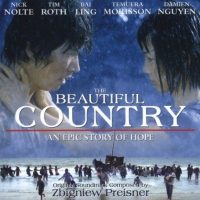The Beautiful Country is story of an Amerasian man from the Delta who leaves his home in search of his mother in the big city. After finding her, there is an accident and he boards a boat with his little brother headed for Malaysia to escape trouble. Binh’s entire life he has been an outcast, raised by his immediate family as on outsider, his tall stature, American facial structure and large feet always stopping him from being accepted. He is hassled by a passenger about not being a true Vietnamese due to his size, and shows the viewer just how rough life as a mixed breed in Vietnam is.
After reaching Malaysia, Binh and his little brother are captured and forced into a refugee camp. Another unseen hiccup in Binh’s life, he and Tam befriend a women named Ling, who helps them bride their way out of the camp during a riot and escape with passage to America on a large freight liner. Binh is able to get the Ling to follow them and the three of them make their way onto the ship.
This film does a good job of capturing the hell the refugees had to face on these ships, trying to escape the life back home in search of a better life in America. Their dismal accommodations of the ship’s hull and the hierarchy created by a fellow passenger, makes conditions even worse and many of them get sick. The gangster character uses intimidation to pressure the travelers to pay him for water and food rations, making them play his games and entertain him on the trip. The lack of food and drinkable water causes many passengers to die. Binh’s little brother eventually succumbs to the starvation and dies on the journey.
Binh confronts the gangster, and stopping his reign over the passengers of the ship. He makes him play his own game, and which was a test each other’s knowledge of America. He ended up stumping the bully and beating him with a stick and then taking the money back he had charged the others for food and clean water.
The challenges continue once Binh and Ling reach the streets of New York City. Then they are outsiders in a foreign place, and tough times are all around. They try to stay in contact but soon they grow apart, Ling’s job of a prostitute is too much for Binh and he leaves the city to go find his father Steve in Texas.
He hitchhikes across the US to Texas, where he finds the farm his father works on. Binh takes a job on the farm besides an old blind man. Steve can tell Bihn is Vietnamese and they talk about his time in Vietnam during the war. Steve shares how beautiful he found the country and tells Bihn of the women he fell in love with. Eventually telling him of the accident he had that took his sight and caused the military to bring him back to the states. Binh gets the answers he came to America for and although they don’t come out and say it. The viewer is left wit the feeling that Steve new this was his son.
This film showed how much family meant to Binh, and the length he would go for the answers to his lifelong questions. There were themes of social classes, family, home and the Amerasian struggles. It went together with this week’s reading of Amie Phan’s We Should Never Meet, as the orphans that came here during operation Baby Lift also searched for their answers not knowing much about their pasts either. The need for a family to be a part of, the desire to be loved, and the struggles they go through as Vietnamese in America.
I switched up my style for this blog post, trying a new approach and tried to keep its length under 2,000 words. We’ll see if I end up going back to my previous style or if I can combine the two different approaches into one cohesive entry.
